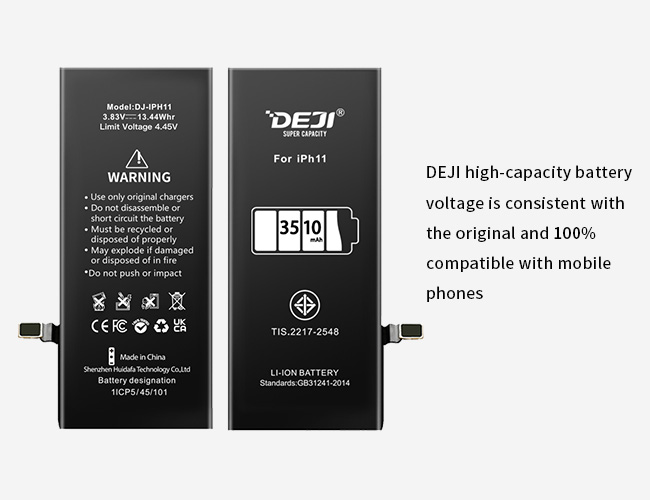In the age of rapid technological advancement, the quest for high-capacity batteries that can keep up with our increasingly demanding devices is more pressing than ever. Among the concerns that often arise is whether these powerhouse batteries are truly safe for our beloved gadgets. Specifically, iPhone users frequently ponder: will high-capacity batteries harm my device? Let's delve into this inquiry with a critical eye and seek clarity on the matter.
Are high-capacity batteries safe?
If you want to know whether a high-capacity iPhone battery is safe, you need to check the battery's voltage value. When the high-capacity iPhone battery voltage value is the same as the original one and is 100% compatible with the phone. Then you don't have to worry, it can be used normally and will not cause any harm to your phone.

Related articles: Understanding iPhone Battery Voltage and Its Relationship with Capacity
What Determines the Capacity of Lithium-Ion Batteries in Phones?
Three factors influence the milliampere-hour (mAh) capacity of lithium-ion batteries in phones: the materials of the cathode and anode, the battery structure, and the electrolyte. DEJI can produce batteries with higher capacity than the original ones by using lithium chemical materials with higher energy density and better cathode and anode materials.
1. Cathode and Anode Materials
The cathode and anode materials are key factors affecting battery capacity. Different materials store different amounts of lithium ions, thus affecting the battery's capacity. Currently, common cathode materials include oxides like lithium cobalt oxide and lithium nickel oxide, while the anode materials are carbon materials and lithium titanate.
2. Battery Structure
The structure of the battery also significantly influences lithium battery capacity. The external shape and internal structural design determine the quality, distribution, and surface area of the cathode and anode materials, affecting the battery's capacity and performance. A rational battery structure design can enhance the energy density and lifespan of the battery.
3. Electrolyte
The electrolyte greatly affects the electrochemical performance of lithium-ion batteries, making it another crucial factor in determining battery capacity. The type, concentration, and conductivity of the electrolyte significantly impact the battery's capacity and performance. Moreover, the electrolyte's quality and purity also affect lithium batteries' safety and stability.
Why doesn't Apple design higher-capacity phone batteries?
Although Apple has been increasing the battery capacity of its iPhones, there's still a notable gap compared to Android phones, such as the latest Samsung Galaxy S24. The reasons include:
Aesthetics and Slimness: Apple's design philosophy prioritizes a sleek and slim appearance, necessitating a compromise on battery capacity. The company aims to make its products compact and lightweight, which limits the space available for the battery.
Battery Life Isn't the Only Selling Point: Apple focuses on creating a perfect user experience rather than just extending battery life. The company prioritizes system optimization and overall smoothness over merely increasing the battery size.
System Optimization: Despite not having the longest battery life, iPhones manage power efficiently through system optimization, allowing them to last longer than Android phones with similar battery capacities. This approach reduces the need for Apple to pursue significantly larger batteries than those found in Android devices.
 sales@batterydeji.com
sales@batterydeji.com




